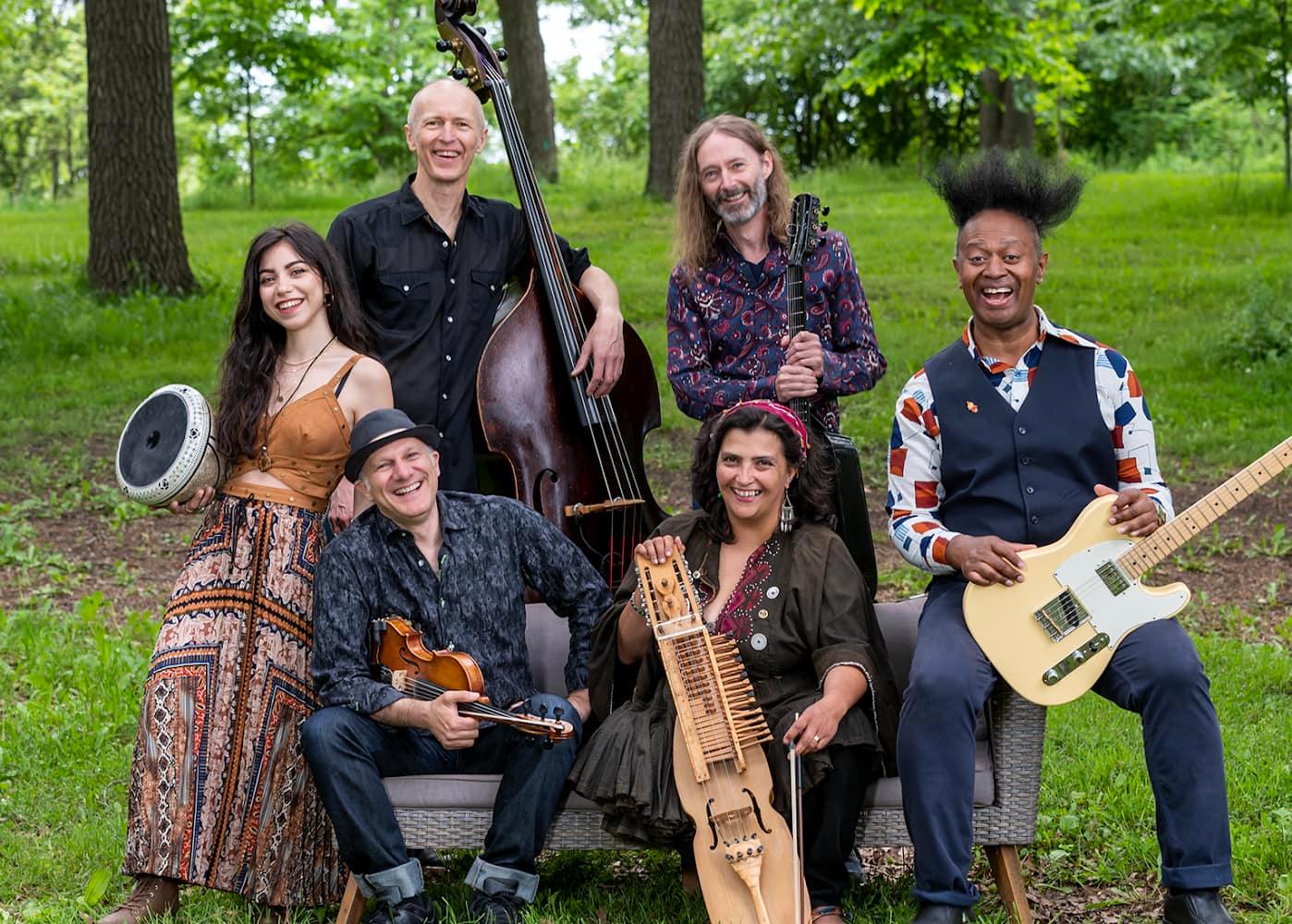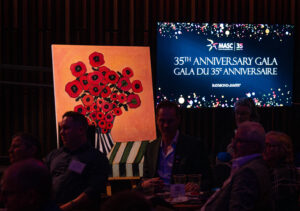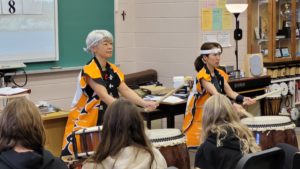MASC Interview: Sultans of String celebrate and share music from around the world
By Jessica Ruano | November 3, 2022

This interview was originally published at Apt613.ca
Sultans of String are three-time JUNO nominees and SiriusXM winners. Thrilling their audiences with their genre-hopping passport of Celtic reels, flamenco, Django-jazz, Arabic, Cuban, and South Asian rhythms, Sultans of String celebrate musical fusion and human creativity with warmth and virtuosity. They recently won Best Musical Film at the Cannes World Film Festival for The Refuge Project—Visual Album. Bandleader Chris McKhool talks about upcoming projects and the magic of being a MASC artist.
Sultans of String always seem to have so much going on! First things first, tell us what’s happening with this Sanctuary (The Refuge Project) virtual concert on Friday, November 4, at 7:30pm.
Chris McKhool: We are so excited about this show! The Sanctuary/Refuge project was designed to highlight the incredible contributions of new immigrants and refugees to Canada. As a world music band, we get so much joy from working with artists from around the world and global talents who are also ambassadors for peace. We love to celebrate the successes of those who make the journey here and bring their extraordinary talents with them, and we hope the conversations we have as musicians will provide a model for peace that will inspire our politicians and citizens.
Our November 4 concert has an incredible lineup: singer Leen Hamo and clarinet player Majd Sekkar, both exceptional musicians and refugees from Syria; Persian percussionist Naghmeh Farahmand and tar player Padideh Ahrarnejad; Donné Roberts from Madagascar; a scarf dance by Tamar Ilana; and Saskia Tomkins on nyckelharpa. We will broadcast live from the Zoom Room we developed during the pandemic with a six-camera shoot from our digital soundstage, the same one we use for our MASC livestreams. It’s going to be a party!

Sultans of String. Photo: Jake Jacobsen.
Rumour has it you’re raising funds to support upcoming collaborations with an impressive list of Indigenous artists (including Crystal Shawanda, Don Ross, and Dr. Duke Redbird) from across Turtle Island. What inspired this project, and what do you hope will come of it?
Yes, we are currently recording our ninth album, a beautiful collection of collaborations with First Nations, Métis, and Inuit artists across Turtle Island/Canada. We want to make a difference in the world with the music we play, so we’re making this album in the spirit of the Truth and Reconciliation Commission’s 94 Calls to Action and Final Report that asks for Indigenous and non-Indigenous people to work together as an opportunity to show a path forward.
We know that, as a society, we can’t move ahead without acknowledging and reflecting on the past. Before reconciliation can occur, the full truth of the Indigenous experience in this country needs to be told, so we’ve been inviting Indigenous artists to share their stories, their experiences, and their lives, so we settler Canadians can continue our learning about the history of residential schools, cultural genocide, and intergenerational impacts of colonization.

Sultans of String. Photo: David McDonald.
Sultans of String has been around since 2007, and you’ve worked with so many other artists. Over the past 15 years, what have you learned about what makes a good collaboration?
For us, it starts with an idea, something that we feel is important and needs to be said, and then reaching out to people we want to share voices and opinions with. We need a space and platform where everyone can be heard equally and contribute to the song. Also, we need to be open to new ideas and work together to come up with a statement or piece of art that captures elements of all the ideas that people are contributing.
In our current project, we are collaborating with the group Northern Cree, who create Pow Wow music that is outside of our typical song form. This requires a deep dive to figure out how to bridge our two musical worlds without interfering with or changing the core of what Northern Cree does. The pieces finally fell into place, and we unlocked the way for the musical worlds to connect in a respectful way. It has grown from there, and now the piece keeps morphing and changing. It is like watching a tree grow from seed right in front of our eyes.

Northern Cree and Chris McKhool. Photo: Chris McKhool.
As a member of MASC, what do you gain through offering your workshops in schools and the community?
I really love sharing music and stories through the arts with audiences of all ages. It is a great way to connect with others and share thoughts and ideas that are important to me, as there is an element of community-building in the presentations we develop. Of course, it is only a concert if there is an audience, and as artists, we receive a lot of energy from presenting our work—especially when working in schools! It is a true joy to feel the energy of the students, to see the musical spark in them as they ask questions, and to imagine the amazing music and art they are going to create as they get older.
Why do you think it’s important for our local community to have access to professional artists?
For some, school is the only place where they may have exposure to the arts, so it is super important that we provide artistic works at a high level for students. Young people, just like adults, use the arts to make sense of the world around them and the complex feelings they experience.
I was personally very inspired as a young musician by seeing performances throughout my elementary and secondary years, and that was a very important part of my development in becoming an artist myself. I was exposed to concerts at my school, performances out in the community, and even seeing the National Arts Centre Orchestra. These experiences were all part of the big picture I formed of the depth and breadth of what was musically possible.
Latest News
View All Articles



